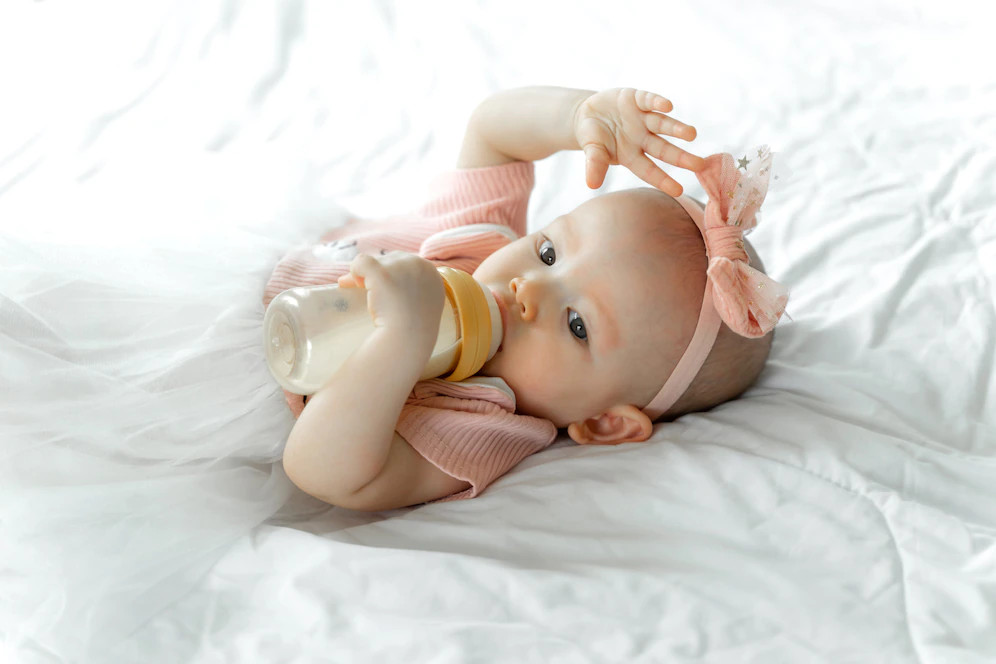ASI adalah sumber nutrisi yang sangat penting bagi bayi. Hingga bayi berusia 6 bulan, disarankan secara eksklusif hanya memberi bayi ASI saja tanpa makanan atau minuman tambahan lainnya.
ASI mengandung nutrisi yang lengkap seperti laktosa yang menyediakan energi bagi bayi dan membantu penyerapan kalsium, magnesium, serta fosfor. ASI juga mengandung protein, lemak, dan vitamin. Dari manakah semua nutrisi penting itu berasal?
Sumber Nutrisi ASI
Kandungan nutrisi ASI berasal dari berbagai sumber dan proses yang terjadi di dalam tubuh ibu. Nutrisi yang didapat ibu dari makanan dan minuman yang dikonsumsi berkontribusi terhadap komposisi nutrisi ASI. Misalnya vitamin, mineral, protein, lemak, dan karbohidrat yang ada dalam makanan ibu akan diserap oleh tubuh kemudian akan masuk ke dalam ASI.
Kualitas dan variasi makanan yang dikonsumsi ibu sangat berpengaruh terhadap kandungan nutrisi di dalam ASI. Oleh karena itu, diet seimbang dengan berbagai makanan sehat akan membantu memastikan bahwa ASI mengandung nutrisi baik yang dibutuhkan bayi.
Bagaimana Makanan Mempengaruhi Komposisi ASI?
ASI diproduksi oleh kelenjar susu di tubuh ibu, dan komposisinya dipengaruhi oleh berbagai faktor, termasuk genetik, kesehatan, dan asupan makanan. ASI terdiri dari air, karbohidrat, lemak, protein, vitamin, dan mineral, serta antibodi yang penting untuk melindungi bayi dari infeksi.
Meskipun tubuh Anda berusaha untuk memproduksi ASI yang berkualitas terlepas dari pola makan, ada beberapa elemen dari makanan Anda yang dapat secara langsung memengaruhi kandungan nutrisi dalam ASI.
Lemak
Komposisi lemak dalam ASI dipengaruhi oleh makanan yang dikonsumsi ibu. Misalnya jika ibu mengonsumsi banyak makanan yang kaya akan asam lemak omega-3 seperti ikan, kacang-kacangan, dan biji-bijian, maka kadar asam lemak omega-3 dalam ASI akan meningkat.
Vitamin dan mineral
Beberapa vitamin dan mineral dalam ASI juga dapat dipengaruhi oleh pola makan ibu. Vitamin yang larut dalam lemak, seperti vitamin A, D, E, dan K, dapat berubah tergantung pada asupan ibu. Misalnya, jika ibu mengonsumsi lebih banyak makanan yang kaya akan vitamin D atau terpapar sinar matahari yang cukup, maka kadar vitamin D dalam ASI cenderung meningkat.
Antibodi dan komponen kekebalan
Meskipun antibodi yang terdapat dalam ASI tidak langsung bergantung pada makanan, kesehatan umum Anda termasuk status gizi dapat memengaruhi kemampuan tubuh dalam menghasilkan komponen kekebalan ini.
Baca Juga: Serba-Serbi Cara Mencairkan, Menghangatkan, dan Menggunakan ASI (Air Susu Ibu) Perah
Makanan yang Perlu Diperhatikan Selama Menyusui
Sebagian besar makanan aman untuk dikonsumsi selama menyusui. Namun, ada beberapa jenis makanan dan minuman yang perlu diperhatikan selama menyusui, di antaranya:
Makanan dan minuman yang berkafein
Kafein dari makanan maupun minuman dapat diserap ke dalam ASI, meskipun dalam jumlah yang sangat kecil. Bayi yang terlalu banyak terpapar kafein, mungkin menjadi lebih rewel dan sulit tidur. Untuk itu, batasi konsumsi kafein sekitar 200-300 mg per hari atau setara dengan 1-2 cangkir kopi.
Baca Juga: Tentang ASI (Air Susu Ibu) Bubuk, Ketahui Plus Minusnya
Makanan dan minuman yang beralkohol
Alkohol juga bisa masuk ke dalam ASI dan memengaruhi perkembangan otak serta sistem saraf bayi. Ibu yang menyusui sebaiknya menghindari alkohol atau menunggu dua sampai tiga jam setelah minum alkohol sebelum menyusui.
Makanan yang memicu alergi
Meskipun jarang, beberapa bayi mungkin sensitif terhadap makanan tertentu yang dikonsumsi ibu, seperti susu sapi, kacang, atau telur. Apabila bayi menunjukkan tanda-tanda alergi seperti ruam, diare, atau rewel berlebihan sebaiknya perhatikan pola makannya dan konsultasikan dengan dokter anak.
Apabila selama menyusui Anda kebingungan memilih jenis makanan dan minuman yang terbaik untuk bayi, Anda bisa berkonsultasi dengan dokter atau ahli gizi. Anda juga bisa memanfaatkan layanan konsultasi kesehatan Ai Care yang bisa diunduh di App Store atau Play Store.
Mau tahu informasi seputar kehamilan, menyusui, kesehatan wanita dan anak-anak? Cek di sini, ya!
- dr Nadia Opmalina
Children's Hospital of Philadelphia. Diet for Breastfeeding Mothers. Available from: https://www.chop.edu/pages/diet-breastfeeding-mothers
Francesca Bravi, et all (2021). Dietary Patterns of Breastfeeding Mothers and Human Milk Composition: Data from the Italian MEDIDIET Study. Available from: https://www.ncbi.nlm.nih.gov/pmc/articles/PMC8160768/
Mayo Clinic (2022). Breastfeeding nutrition: Tips for moms. Available from: https://www.mayoclinic.org/healthy-lifestyle/infant-and-toddler-health/in-depth/breastfeeding-nutrition/art-20046912
Australian Breastfeeding Association. Breastfeeding and your diet. Available from: https://www.breastfeeding.asn.au/resources/breastfeeding-your-diet
Dr. Liji Thomas, MD (2021). The Constituents of Breast Milk. Available from: https://www.news-medical.net/health/The-Constituents-of-Breast-Milk.aspx
Su Yeong Kim, MD and Dae Yong Yi, MD, PhD (2020). Components of human breast milk: from macronutrient to microbiome and microRNA. Available from: https://www.ncbi.nlm.nih.gov/pmc/articles/PMC7402982/
Adda Bjarnadottir, MS, RDN and Jillian Kubala, MS, RD (2024). Breastfeeding Diet 101: What to Eat While Breastfeeding. Available from: https://www.healthline.com/nutrition/breastfeeding-diet-101
Cleveland Clinic (2024). What To Eat and Foods To Avoid While Breastfeeding. Available from: https://health.clevelandclinic.org/breastfeeding-diet
WebMD (2023). Is Caffeine Safe While Breastfeeding?. Available from: https://www.webmd.com/baby/is-caffeine-safe-while-breastfeeding
CDC. Alcohol. Available from: https://www.cdc.gov/breastfeeding-special-circumstances/hcp/vaccine-medication-drugs/alcohol.html











